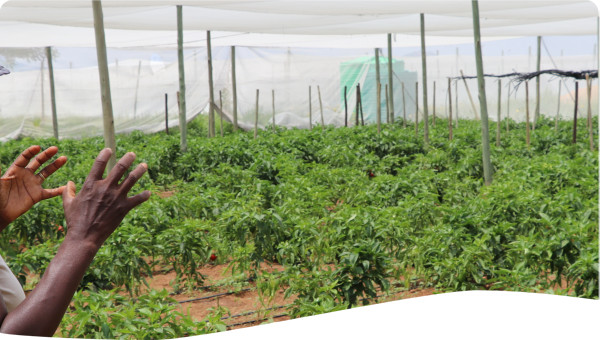Amkeni Wamama has led a project in the Democratic Republic of Congo aimed at empowering women to take the lead in managing drought-prone lands. This project aims to strengthen the capacities of 80 women and girls in four villages — Bembey, Rwampara, Tokodo, and Mandro — to develop and implement innovative solutions for drought resilience, improve women’s access to the resources and technologies needed to cope with drought, and promote women’s participation in decision making on climate change.
Ituri Province is one of the regions affected by drought, with devastating impacts on local populations, particularly women and children. The effects of global warming are evident on the population and the environment, particularly the rise in temperature with intense heat, climatic disruptions increasing food crises, and reduced quality of water for diverse uses in the community.
The project is structured around three main axes:
- Support for local initiatives: The project will support local initiatives led by women and girls that contribute to drought resilience.
- Capacity building: The project will provide training and workshops to women and girls to strengthen their skills in agroforestry, soil conservation techniques, drought-resistant crops, and environmental protection, enabling them to develop and implement innovative solutions for drought resilience.
- Women’s empowerment: Promotion of gender equality and the active engagement of women in decision making in diverse spaces.
Beneficiaries were be supported in planting at least 50 trees per beneficiary in each village to support land restoration. They will be mobilised to make space profitable as a result of agroforestry and crops. The trees will help improve the air quality in the community and serve as a means of empowerment. Corn, beans, and soy will be used to feed their households and encourage financial autonomy. The beneficiaries will design and build improved stoves that they can also resell to meet the various needs of their families; these are stoves that use reduced amounts of fuel, which is beneficial for air quality and environmental health.
This project aims to contribute to SDGs 13 (climate action) and 15 (life on land). In Ituri Province, women play a crucial role in managing drought-prone lands. They are often the first to experience the impacts of drought and have developed unique knowledge and practices to cope. In the agri-cultural sector, women represent most of the workforce and play an essential role in the family economy and the country. Women collect and transport water for domestic consumption, garden irrigation, and livestock farming. They manage water resources sustainably and equitably, and are adopting water conservation techniques, like rainwater harvesting and drip irrigation.
As women are responsible for agriculture and food processing in the home, they are responsible for changes, such as cultivating drought-resistant crop varieties using sustainable techniques. They diversify food sources to guarantee family food security, plant legumes to fertilise the soil, trees, and shrubs to combat erosion and desertification, use improved stoves to reduce excessive firewood consumption, and apply soil conservation techniques, such as mulching and crop rotation, to protect biodiversity and natural resources.
In household waste management, biodegradable waste is preserved and used to fertilise fields, and nondegradable substances are disposed of sustainably. Waste is recycled and transformed. Women also plant fruit trees and lawns to combat erosion and maintain the soil.
Women raise awareness in communities about the dangers of drought and provide information and education on SLM practices. They educate children on the importance of environmental protection, reforestation, and agroforestry to improve fertility and diversify food sources. Further, they take on leadership roles in local organisations and development initiatives, contribute to the research and development of sustainable solutions to drought, and mobilise funds to organise meetings and community awareness on women‘s roles in environmental protection. Women are key actors in managing drought-prone lands. Their contribution is essential to strengthen community resilience to climate change and guarantee a sustainable future.
Despite the positive outcomes and growing leadership of women in drought resilience, several persistent challenges remain:
- Hindered access to essential resources, equipment, and training: Women have difficulty accessing natural resources, like land, water, and financial credit. They lack the equipment and technologies necessary to implement their innovative solutions, and face cultural and social obstacles (e.g. lack of right to inheritance). Support is needed to mobilise financial resources for women’s projects and to provide women with necessary training and information to strengthen their leadership and land management skills and gain technical support to be able to adapt technologies and practices to their specific local contexts.
- GBV and discrimination: Women face risks of GBV and discrimination, preventing them from fully participating in decision making and land management at both family and community levels.
1. Community-led resilience by women is sustainable when backed with local knowledge and practical tools.
Empowering women through agroforestry, soil conservation, and drought-resistant farming proved effective and replicable in similar rural, drought-prone settings.
2. Women's leadership and inclusion at all levels is crucial for sustainable land management.
Supporting their access to resources, training, and decision-making enables long-term environmental and social impact, especially in fragile regions.
3. Simple, low-cost technologies like improved stoves and tree planting are scalable.
They enhance both livelihoods and environmental outcomes, making them suitable for adaptation across other communities with limited resources.
4. Integrating gender equity into climate strategies boosts effectiveness.
Other countries can replicate this approach by embedding women’s empowerment into national climate policies and rural development programs.
5. A multi-level support structure increases project impact.
Collaboration between local champions, civil society, researchers, and policymakers ensures sustainability and helps replicate results in diverse contexts.
